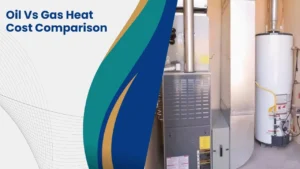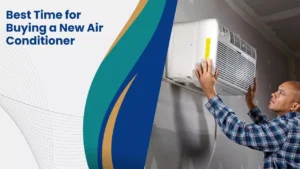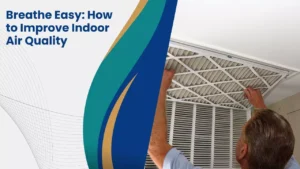The comfort of workers, shoppers, and socializers depends on Indoor Air Quality (IAQ). This matters for two main reasons: Generally, indoor air pollution is higher than outdoor air pollution.
Nearly 90% of the population stays indoors, where air pollution is severe. Air quality affects health positively and negatively. Air pollution from several sources harms our health, work performance, and happiness.
Causes Of Indoor Air Pollution
The following indoor air pollutants are among the most common sources of this problem:
Chemicals
Chemical pollutants are a common source of air pollution and present serious health concerns to humans. Examples include cleaning products, cigarette smoke, tobacco smoke, and carbon monoxide gas.
Biological contaminants
Pollen, dust mites, germs, viruses, and mould are included in this large category. Generally speaking, maintaining adequate ventilation, managing humidity levels, and practicing excellent cleanliness can help reduce these pollutants.
Particles
Human activities like remodelling and cleaning can release dust and other airborne particles into the environment, where they may remain for a considerable amount of time. These airborne particles have the potential to be unhealthy when inhaled.
Also check: Choosing The Right Commercial HVAC Maintenance Plan
Importance Of improved Indoor Air Quality
Most people do not realize that improved indoor air quality is as important as cooling comfort. The assumption that a cool environment is ideal can be misleading; thermal comfort while neglecting air quality can lead to serious health problems such as breathing and allergic reactions when employees are sick with the flu, nausea, or headaches while on the job; it can lead to decreased productivity or even absenteeism as they visit the doctor.
Ways To Improve Indoor Air Quality (IAQ) With HVAC Solutions
Some ways to improve indoor air quality are:
Maintenance Of HVAC
Keeping the air filters clean or replaced regularly could be all that’s needed. Thorough Maintenance and Repair of HVAC may necessitate cleaning of the evaporators, condenser coils, and ducts (for ducted air conditioning systems). The ducts will be inspected for sediment and dust by a licensed HVAC technician.
High-quality Air Filters
Use high-quality air filters with a high minimum efficiency reporting value to get improved indoor air quality (MERV). A rating scale of 1 to 4 is assigned to fibreglass filters, and a rating scale of 5 to 8 is assigned to pleated filters. Higher-rated products can capture bigger particles, resulting in cleaner air within your house. HEPA and ULPA are the two types of filters renowned for their effectiveness.
Particularly if they are constantly getting dirty, you should clean your air filters frequently. Also, change them out every three months (or less frequently if you have animals). Have your HVAC contractor inspect the filters and recommend higher grade types if necessary. The contractor will need to check with the manufacturer to determine compatible types.
Install An Air Purifier
Putting in an air purifier is one way to make the air inside a building better. Air filters, which are basically small air cleaners, are a common part of HVAC systems. Air purifiers work in a similar way, capturing dust and germs with electrostatic fields and HEPA filters (bacteria, fungi, viruses). Other types of air purifiers include:
- Ionizing purifiers
- Ozone generators
- Adsorbents
- UV Light
You can only vacuum and dust so much to improve indoor air quality. Air purifiers work by trapping even more of the particles that even the most high-quality vacuums and dusters tend to miss. In a way, you can consider your vacuum a doctor, but an air purifier is a specialist. Some of the pollutants air purifiers can pull from your air include:
- Pollen
- Animal dander
- Tobacco smoke
- Bacteria
- Viruses
Most air purifiers can trap particles as small as one micron or even a third of a micron. This means that even particles that cause the common cold can be filtered out of your home with an air purifier (definitely something your vacuum does not do).
Install A Dehumidifier
Are you wondering if I need a dehumidifier? Dehumidifiers reduce humidity to remove moisture. Due to biological contaminants, maintaining relative humidity may be ideal. Mold, dust mites, and pathogens enjoy damp air. Atmospheric moisture is reduced by it, and hence, indoor air quality is improved. K2 Mechanical provides the best Dehumidifier Services.
Carbon Monoxide Detectors
Carbon monoxide is one of the most deadly biological contaminants in indoor air. Because it doesn’t taste or smell good and is missing. Many carbon monoxide poisoning victims are unaware of their illness.
Install a carbon monoxide sensor if you cook or heat with gas. Unreliable gas appliances can release carbon monoxide into homes, killing people.
When To Improving Your Air Quality?
Some air quality problems are impossible to resolve independently, no matter how diligent you are. More than ten years of HVAC systems are more likely to experience this. Your system’s efficiency and emissions will both decrease after ten years (or even more). The next step is to install the HVAC systems. Although it’s conceivable that the HVAC system could merely need partial replacement, the chances of this being the case are higher. Paying close attention to cleaning, Repair, and Maintenance of HVAC can ensure that your HVAC system operates efficiently and lasts a long time.
Conclusion
Installing an HVAC system is your sole option to improve indoor air quality. If we implement the right ventilation, filtration, and maintenance systems to improve the air quality within your home, we can keep the place clean and safe for everyone. By prioritizing these procedures, we may preserve residents’ health, improve their well-being, and increase productivity. We also emphasize how important HVAC systems are in creating a healthy and quiet interior environment.





